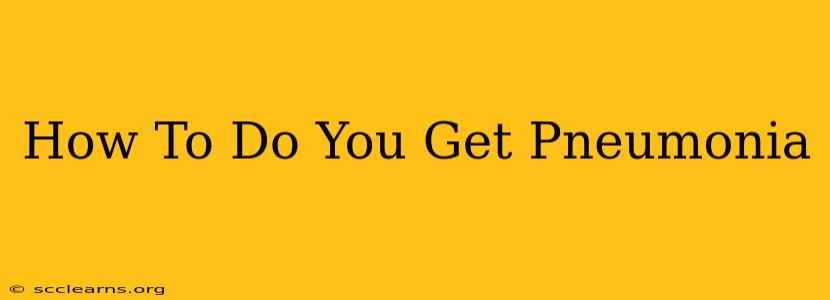Pneumonia, a lung infection causing inflammation in the air sacs, can be a serious illness. Understanding how you get pneumonia is crucial for prevention and effective treatment. This comprehensive guide will explore the various causes, risk factors, and preventative measures you can take to protect yourself.
What Causes Pneumonia?
Pneumonia is primarily caused by infections, most commonly viral or bacterial. Less frequently, it can be caused by fungi or parasites. Let's break down the key culprits:
1. Bacteria:
- Streptococcus pneumoniae: This is the most common bacterial cause of pneumonia. It's highly contagious and can spread through respiratory droplets.
- Haemophilus influenzae: Another common bacteria, often associated with pneumonia in younger children and the elderly.
- Legionella pneumophila: This bacteria is found in water sources and can cause a severe form of pneumonia called Legionnaires' disease.
2. Viruses:
- Influenza (Flu): The flu virus itself can cause pneumonia, or it can weaken the lungs, making them more susceptible to other infections.
- Respiratory Syncytial Virus (RSV): Common in young children, RSV can lead to pneumonia and bronchiolitis.
- Other Viruses: Many other viruses can cause or contribute to pneumonia, including adenoviruses, coronaviruses, and rhinoviruses.
3. Fungi:
Fungal pneumonia is less common but can occur in individuals with weakened immune systems or those exposed to specific fungal spores.
4. Aspiration:
In some cases, pneumonia can develop when food, liquids, or vomit is inhaled into the lungs (aspiration).
Who is at Risk of Getting Pneumonia?
Certain groups are at a higher risk of developing pneumonia due to weakened immune systems or other underlying health conditions:
- Infants and Young Children: Their immune systems are still developing.
- Older Adults: Their immune systems are often weaker, making them more vulnerable.
- People with Chronic Diseases: Conditions like asthma, COPD, diabetes, and heart disease increase susceptibility.
- Smokers: Smoking damages lung tissue and weakens the body's defenses.
- People with Weakened Immune Systems: Individuals with HIV/AIDS, undergoing chemotherapy, or taking immunosuppressant medications are at increased risk.
- Those in Healthcare Settings: Hospitals and nursing homes can be breeding grounds for infectious agents.
Preventing Pneumonia: Protecting Yourself
While you can't entirely eliminate the risk of pneumonia, you can significantly reduce your chances by taking proactive steps:
- Vaccination: The pneumococcal vaccine and the influenza vaccine are highly effective in preventing pneumonia caused by these specific pathogens.
- Practice Good Hygiene: Frequent handwashing, covering your cough or sneeze, and avoiding close contact with sick individuals helps prevent the spread of infection.
- Don't Smoke: Smoking is a major risk factor; quitting is crucial for lung health.
- Manage Chronic Conditions: Effectively managing underlying health conditions reduces your risk.
- Healthy Lifestyle: Maintaining a healthy lifestyle, including a balanced diet, regular exercise, and adequate sleep, strengthens your immune system.
When to Seek Medical Attention
If you experience symptoms such as a cough (especially with phlegm), fever, chills, shortness of breath, chest pain, or fatigue, seek immediate medical attention. Early diagnosis and treatment are crucial for a successful recovery.
This information is for general knowledge and does not constitute medical advice. Always consult with a healthcare professional for any health concerns or before making any decisions related to your health or treatment.

